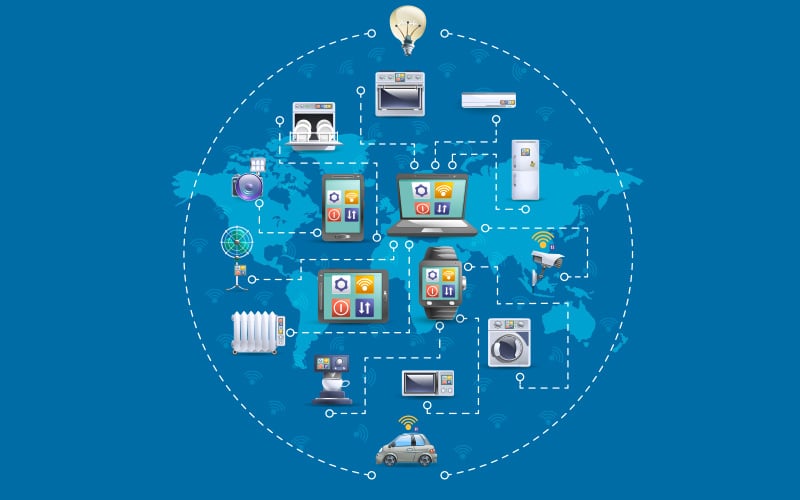The Internet of Things: a simple explanation

The Internet of Things, or IoT, is a term coined by Kevin Ashton in 1999 that lots of people use, but few actually understand.
In a nutshell, IoT refers to the ability to connect devices – other than typical devices, like mobiles or laptops – to the Internet or each other, like a vending machine that shows what drinks need replacing, or a smart watch or fitness tracker, or your fridge.
Believe it or not, fridges have indeed bumped up their game and do more than keep your food cold; for example, they can give you recipes based on the food you’ve got inside and order your groceries online for delivery based on what you consume. You may never run out of milk again. Check out Samsung’s smart fridge.
Here is a video from Intel that explains IoT in simple terms:
- Efficiency: Communication among devices can lead to better service quality, task uniformity, and quicker action in emergencies.
- Economy: Better device monitoring can save energy and resources and reduce device damage by powering them down when they’re not in use.
- Quality of Life: If technology does more things for you, it stands to reason that you then experience increased comfort, convenience, and time management.
- New Jobs: New technology may mean new jobs in tech, including chief IoT officer, C++ and cloud developers, and IoT business developers.
- Monitoring: Up-to-the-minute data means we have the ability to monitor important things in real time, patient health and home security among them.
- Cost: Smart products are more expensive than their “non-smart” versions, as they require more special parts and technology. Over time, the cost will drop. In some cases, the technology will simply become standard, which means you may no longer have a choice, but to connect your water bottle to Wi-Fi (for one, extreme example).
- Security: The more devices you connect to the Internet, the more likely your device will be hacked or get a virus – and the greater the need to ensure your security software is up to date.
- Privacy: Privacy is not just about someone spying on you through your device’s camera. It’s also about Big Data: the more IoT devices you have, the more data you inadvertently share, and the more companies and marketers know about you.
- Overload: We’ve already seen studies about children experiencing digital overload (read CNN’s article from Feb. 2018, “Screen time: Mental health menace or scapegoat?”). What will happen to our mental and physical well being when everything is interactive and connected?
- Manual jobs: There will likely be fewer manual jobs owing to IoT, such as manufacturing.
The future is now. Your TV already browses the Internet, your home already automatically turns on the heat, and cars already drive themselves. Gartner, a leading research and advisory company, predicts there will be 20.4 billion connected “things” by 2020.
What is the long-term future of IoT and what will the net effects be on humankind? These are big questions, and it’s an understatement to say the answers will have huge implications and consequences for our lives and our planet. Stay tuned…or should I say, connected?
If you want to learn more about IoT, send me a message. We’re always happy to chat! Contact us at sales@365tech.ca or call 204-488-3655.




